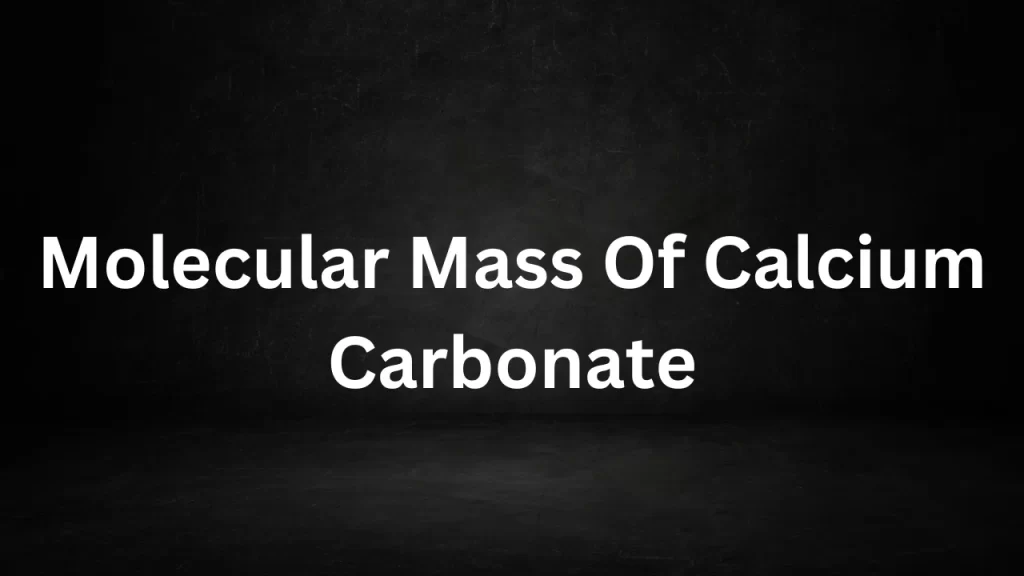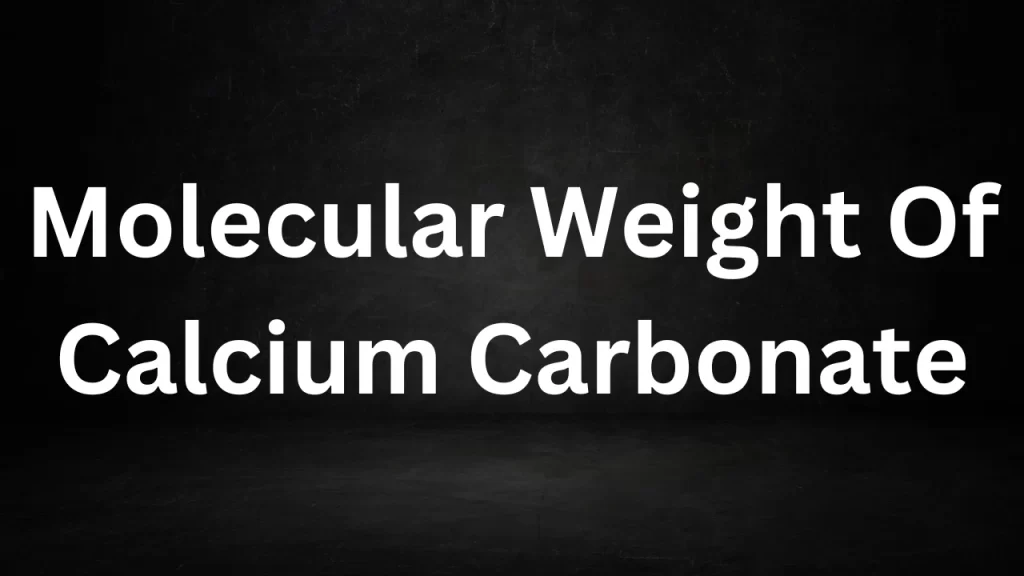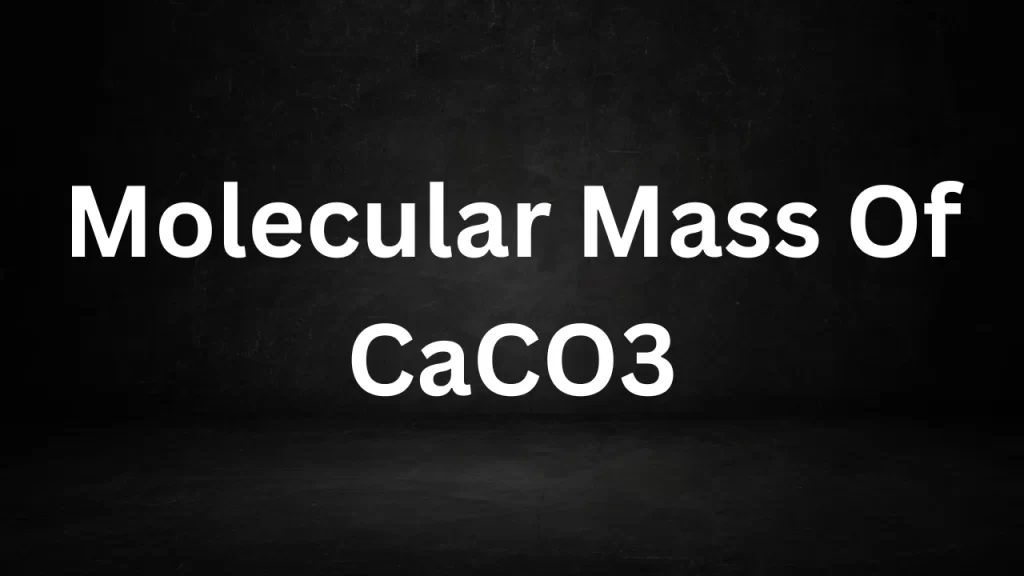Tag: molecular weight calcium carbonate
Molecular Mass Of Calcium Carbonate
Molecular Mass Of Calcium Carbonate: The molecular mass of calcium carbonate, often referred to as calcium carbonate’s molar mass, is a fundamental concept in chemistry.
It plays a crucial role in various scientific fields, including chemistry, geology, environmental science, and industry. In this article, we will explore what the molecular mass of calcium carbonate is, how it is calculated, its significance, and its practical applications.

Molecular Mass Of Calcium Carbonate
Defining Molecular Mass
The molecular mass, also known as molar mass, of a compound is the mass of one mole of that substance expressed in grams per mole (g/mol). In the case of calcium carbonate (CaCO3), its molecular mass represents the combined mass of one mole of calcium (Ca) atoms, one mole of carbon (C) atoms, and three moles of oxygen (O) atoms.
Calculation of Molecular Mass
To calculate the mole mass of calcium carbonate (CaCO3), we sum the atomic masses of its constituent elements:
- Calcium (Ca): Atomic mass ≈ 40.08 g/mol
- Carbon (C): Atomic mass ≈ 12.01 g/mol
- Oxygen (O): Atomic mass ≈ 16.00 g/mol
Now, let’s calculate the mole mass of CaCO3:
Molecular Mass of CaCO3 = (Molar Mass of Ca) + (Molar Mass of C) + (3 × Molar Mass of O)
The Molecular Mass of CaCO3 = (40.08 g/mol) + (12.01 g/mol) + (3 × 16.00 g/mol)
Molecular Mass of CaCO3 ≈ 100.09 g/mol
Therefore, the mole mass of calcium carbonate (CaCO3) is approximately 100.09 grams per mole.
Significance in Chemistry
- Stoichiometry: The mole mass of calcium carbonate is fundamental in stoichiometry, allowing chemists to calculate the quantities of reactants and products in chemical reactions involving CaCO3.
- Formulation Chemistry: It is important in industries like agriculture and pharmaceuticals for formulating products that contain calcium carbonate.
- Environmental Science: Knowledge of the molecular mass of CaCO3 is essential for understanding its role in environmental processes, such as the dissolution of limestone in natural waters.
Real-World Applications
- Geology: The mole mass of calcium carbonate is crucial in geological studies, where it helps identify and quantify carbonate minerals in rocks and sediments.
- Agriculture: Calcium carbonate is commonly used as a soil conditioner and in the formulation of agricultural products, benefiting from its mole mass calculations.
- Pharmaceuticals: It finds applications in antacids and calcium supplements, where the molecular mass influences dosages and formulations.
- Environmental Monitoring: Understanding the mole mass is important for analyzing the presence and concentration of calcium carbonate in natural water bodies, which can affect water quality and aquatic life.
Conclusion
The mole mass of calcium carbonate (CaCO3), approximately 100.09 g/mol, is a foundational concept in chemistry with broad-reaching implications. It serves as a cornerstone in stoichiometry, formulating various industrial products, and understanding environmental processes. Additionally, its significance extends to geological studies, agriculture, pharmaceuticals, and environmental monitoring. An in-depth comprehension of the mole mass of calcium carbonate is not only essential for scientific research but also for addressing practical challenges in diverse fields.
Read More
- Molar Mass Of Carbon Dioxide
- Difference Between Force And Momentum
- Law Of Conservation Of Linear Momentum
- Molecular Weight Of MgSO4
- Molecular Weight Of H3PO4
Frequently Asked Questions (FAQs) On Molecular Mass Of Calcium Carbonate
1. What is the molecular mass of calcium carbonate (CaCO3)?
The mole mass of calcium carbonate (CaCO3) is approximately 100.09 grams per mole (g/mol).
2. How is the molecular mass of calcium carbonate calculated?
To calculate the molecular mass of CaCO3, you sum the atomic masses of its constituent elements: calcium (Ca), carbon (C), and oxygen (O).
3. What is the atomic mass of calcium (Ca)?
The atomic mass of calcium is approximately 40.08 g/mol.
4. What is the atomic mass of carbon (C)?
The atomic mass of carbon is approximately 12.01 g/mol.
5. What is the atomic mass of oxygen (O)?
The atomic mass of oxygen is approximately 16.00 g/mol.
Molecular Weight Of Calcium Carbonate
Molecular Weight Of Calcium Carbonate: In the world of chemistry, the molecular weight of a compound is a fundamental concept that underpins various aspects of chemical analysis and research.
One compound that serves as an excellent illustration of this concept is calcium carbonate (CaCO3). In this article, we will explore the molecular weight of calcium carbonate and its significance in chemistry and everyday life.

Molecular Weight Of Calcium Carbonate
Calcium Carbonate (CaCO3): The Basics
Before delving into the molecular weight of calcium carbonate, let’s acquaint ourselves with this compound. Calcium carbonate, represented chemically as CaCO3, is a common chemical compound with widespread applications in various fields.
In its native state, calcium carbonate is present in geological formations and minerals like limestone, marble, and chalk. For centuries, these naturally formed deposits have been tapped into for a wide range of purposes, spanning from construction and artistic creations to medicinal applications. Calcium carbonate is also a major component of seashells and pearls.
Understanding Molecular Weight
The molecular weight of a compound is a numerical value that reflects the mass of one mole of that compound. It can be denoted in units such as atomic mass units (amu) or grams per mole (g/mol). To calculate the molecular weight of calcium carbonate, we need to consider the atomic weights of its constituent elements: calcium (Ca), carbon (C), and oxygen (O).
Here are the atomic weights of these elements:
- Calcium (Ca): Approximately 40.08 g/mol
- Carbon (C): Approximately 12.01 g/mol
- Oxygen (O): Approximately 16.00 g/mol
Now, we can calculate the molecular weight of calcium carbonate (CaCO3):
Molecular Weight (CaCO3) = Atomic Weight(Ca) + Atomic Weight(C) + 3 × Atomic Weight(O) Molecular Weight (CaCO3) = 40.08 g/mol + 12.01 g/mol + 3 × 16.00 g/mol Molecular Weight (CaCO3) ≈ 100.09 g/mol
Therefore, the mole weight of calcium carbonate is approximately 100.09 grams per mole.
Significance of Molecular Weight
Understanding the mole weight of a compound, such as calcium carbonate, has several practical implications:
- Stoichiometry: Mole weight plays a crucial role in balancing chemical equations and determining the proportions of substances involved in chemical reactions.
- Concentration Calculations: It is essential for calculating the concentration of calcium carbonate in solutions, which is significant in fields like environmental science and chemistry.
- Molar Mass: Mole weight is used to calculate the molar mass of calcium carbonate, which is useful for quantifying amounts in moles.
- Formulation: In various industries, including agriculture and pharmaceuticals, knowledge of molecular weight aids in formulating products and determining dosages.
- Physical Properties: Molecular weight influences the physical properties of a substance, such as its density and melting and boiling points.
Practical Applications of Calcium Carbonate
Calcium carbonate has a wide range of practical applications. It is used as a dietary supplement, in the paper industry as a filler and coating pigment, in the production of cement and concrete, and as an antacid for heartburn relief. Additionally, it serves as a key component in the manufacturing of ceramics, paints, plastics, and various building materials.
In conclusion, the mole weight of calcium carbonate (CaCO3) is approximately 100.09 grams per mole. This value is not only essential in understanding the composition of calcium carbonate but also pivotal in various scientific, industrial, and everyday applications. Whether you’re studying chemical reactions, determining concentrations, or manufacturing everyday products, the concept of molecular weight remains a cornerstone in the world of chemistry and materials science.
Read More
- Molecular Weight Of Sodium Hydroxide
- Molecular Weight Of Aluminium
- Molecular Weight Of CaCl2
- Molecular Weight Of Copper
- Molecular Mass Of Ethanol
Frequently Asked Questions (FAQs) Molecular Weight Of Calcium Carbonate
1. What is the molecular weight of calcium carbonate (CaCO3)?
The molecular weight of calcium carbonate (CaCO3) is approximately 100.09 grams per mole.
2. Why is the molecular weight of calcium carbonate important in chemistry?
The molecular weight is crucial in chemistry as it provides information about the compound’s mass and composition, which is essential for various calculations, including stoichiometry, concentration determination, and molar mass calculations.
3. What are the constituent elements of calcium carbonate, and what are their atomic weights?
Calcium carbonate consists of three elements: calcium (Ca), carbon (C), and oxygen (O). Here are their approximate atomic weights:
- Calcium (Ca): ~40.08 g/mol
- Carbon (C): ~12.01 g/mol
- Oxygen (O): ~16.00 g/mol
4. How is the molecular weight of calcium carbonate calculated?
The mole weight of calcium carbonate is calculated by summing the atomic weights of its constituent elements: Ca, C, and three O atoms. The calculation is as follows: Molecular Weight (CaCO3) = Atomic Weight(Ca) + Atomic Weight(C) + 3 × Atomic Weight(O)
5. What are some practical applications of calcium carbonate?
Calcium carbonate finds applications across a multitude of industries, encompassing agriculture (as a soil conditioner), pharmaceuticals (as a dietary supplement), construction (in the production of cement and concrete), paper manufacturing (as a filler), and serving as an antacid for relieving heartburn.
Molecular Mass Of CaCO3
Molecular Mass Of CaCO3: The mol mass of calcium carbonate (CaCO3) can be calculated by adding up the atomic masses of all the atoms in one molecule of CaCO3.

Molecular Mass Of CaCO3
Molecular Mass of CaCO3: Unveiling the Chemistry Behind Calcium Carbonate
Chemistry is a fascinating realm of science that allows us to understand the world on a molecular level.
One fundamental concept in chemistry is the mol mass, also known as mol weight or molar mass, which is the mass of a molecule expressed in atomic mass units (amu) or grams per mole (g/mol).
In this article, we will explore the mol mass of a common chemical compound: calcium carbonate (CaCO3).
Calcium Carbonate (CaCO3): A Chemical Compound with Many Roles
Calcium carbonate, denoted by the chemical formula CaCO3, is a compound that plays a significant role in various aspects of our lives. I
t is a naturally occurring substance found in rocks, shells of marine organisms, and even as a mineral in our teeth and bones.
Additionally, calcium carbonate is used in a multitude of industrial applications, such as in the production of cement, chalk, and as a dietary supplement due to its calcium content.
Breaking Down the Molecular Mass of CaCO3
The molecular mass of a compound is determined by adding up the atomic masses of all the atoms present in a single molecule of that compound.
To calculate the molecular mass of CaCO3, we’ll consider the atomic masses of its constituent elements:
- Calcium (Ca): The atomic mass of calcium is approximately 40.08 g/mol.
- Carbon (C): Carbon has an atomic mass of roughly 12.01 g/mol.
- Oxygen (O): The atomic mass of oxygen is around 16.00 g/mol.
Now, let’s perform the calculations:
Molecular Mass of CaCO3 = (Atomic Mass of Ca) + (Atomic Mass of C) + (3 * Atomic Mass of O)
m = (40.08 g/mol) + (12.01 g/mol) + (3 * 16.00 g/mol)
m = 40.08 g/mol + 12.01 g/mol + 48.00 g/mol
m ≈ 100.09 g/mol
So, the molecular mass of calcium carbonate (CaCO3) is approximately 100.09 grams per mole.
Significance of Molecular Mass
Understanding the molecular mass of a compound is essential in various scientific and industrial applications.
It allows chemists to calculate quantities of substances accurately, which is crucial in chemical reactions and formulation of compounds.
For instance, in laboratory experiments, scientists often need to measure reactants and products in moles rather than grams, as moles provide a consistent way to express the amount of a substance.
Furthermore, molecular mass is central to stoichiometry, which is the study of the quantitative relationships between reactants and products in a chemical reaction.
This enables chemists to predict the amounts of products formed from a given amount of reactants.
Conclusion
In the realm of chemistry, understanding the molecular mass of compounds like calcium carbonate (CaCO3) is fundamental.
It provides valuable insights into the composition of substances and is essential for making precise calculations in chemical reactions.
The molecular mass of CaCO3, approximately 100.09 g/mol, highlights the importance of this compound not only in chemistry but also in various industrial and natural processes.
From chalk to seashells and even dietary supplements, calcium carbonate’s versatility stems from its intriguing chemistry and molecular structure.
Read More
- Molecular Mass Of Sulphur
- Equivalent Weight Of Hcl
- Equivalent Weight Of Naoh
- Molecular Mass Of Hcl
- Equivalent Weight Of H2so4
Frequently Asked Questions (FAQs) Molecular Mass Of CaCO3
1. What is the molecular mass of CaCO3?
The molecular mass of calcium carbonate (CaCO3) is approximately 100.09 grams per mole (g/mol).
2. How is the molecular mass of CaCO3 calculated?
The molecular mass of CaCO3 is calculated by adding up the atomic masses of all the atoms in one molecule of CaCO3. Here’s the breakdown:
- Calcium (Ca): Atomic mass ≈ 40.08 g/mol
- Carbon (C): Atomic mass ≈ 12.01 g/mol
- Oxygen (O): Atomic mass ≈ 16.00 g/mol
The calculation is as follows: Molecular Mass of CaCO3 = (Atomic Mass of Ca) + (Atomic Mass of C) + (3 * Atomic Mass of O) Mol Mass of CaCO3 ≈ 40.08 g/mol + 12.01 g/mol + 48.00 g/mol ≈ 100.09 g/mol
3. Why is it important to know the mol mass of CaCO3?
Understanding the mol mass of CaCO3 is crucial in chemistry, as it allows for precise calculations in chemical reactions, stoichiometry, and the formulation of compounds. It is also essential in various industrial applications, such as the production of cement, chalk, and dietary supplements.
4. What are some common uses of CaCO3 in everyday life?
Calcium carbonate (CaCO3) has several everyday uses:
- In construction, it’s used in the production of cement and mortar.
- In education, it’s used to make chalk.
- In healthcare, it’s used as a dietary supplement to provide calcium.
- In agriculture, it’s used as a soil conditioner to neutralize acidic soils.
- In the food industry, it’s used as a food additive (E170) in products like toothpaste and baking powder.
- In the pharmaceutical industry, it’s used as an antacid to treat heartburn and indigestion.
5. Is CaCO3 a natural or synthetic compound?
Calcium carbonate can be found naturally in various forms, such as limestone, chalk, and marble. It can also be synthesized for specific industrial applications.